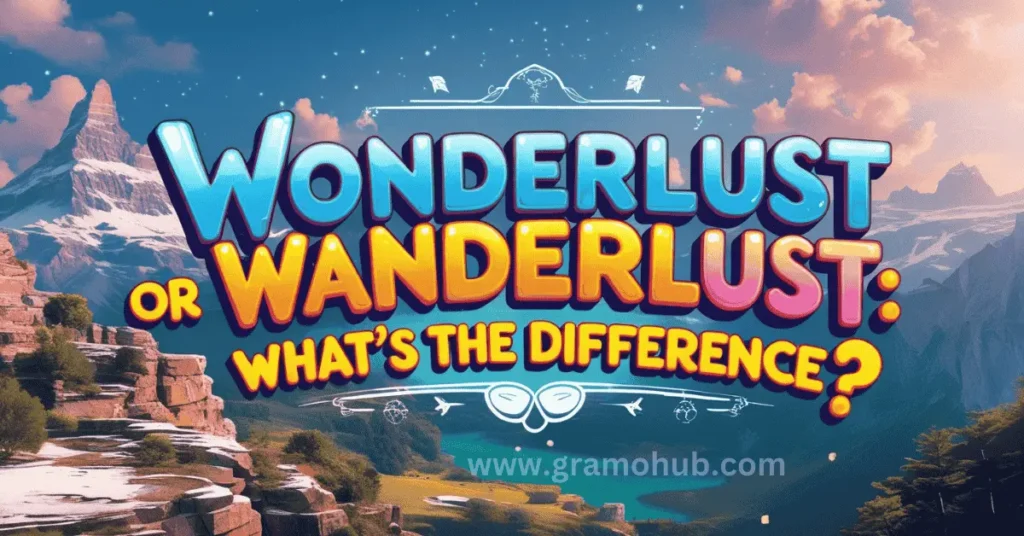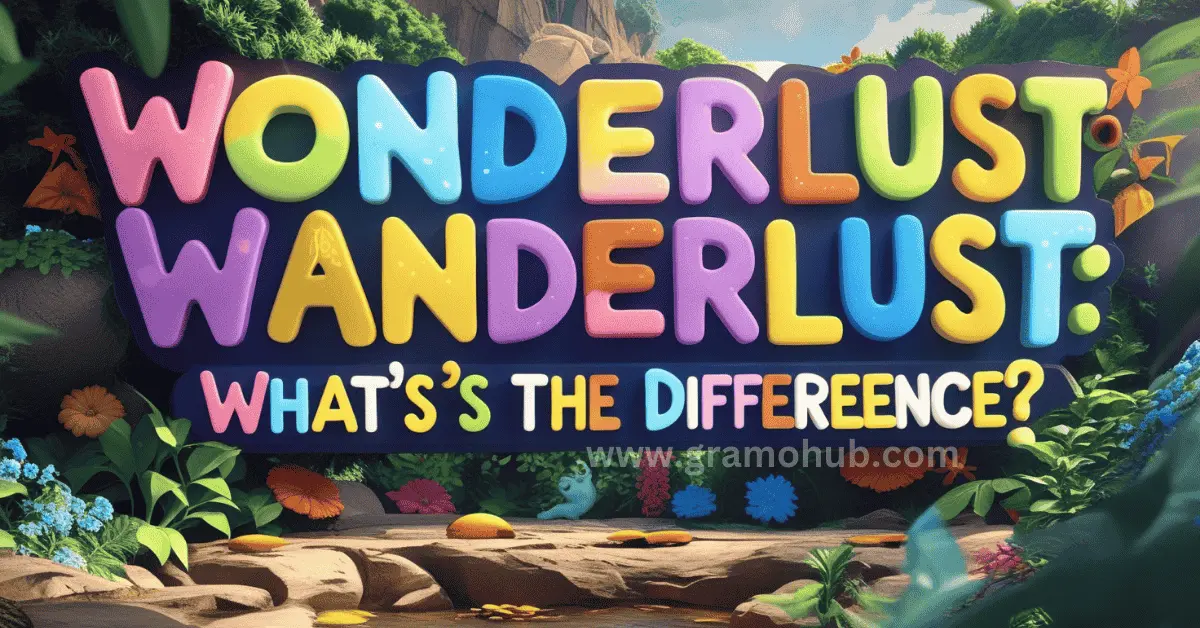Have you ever found yourself wondering whether it’s “wonderlust” or “wanderlust”? The two terms sound almost identical but have different meanings and origins. It’s easy to confuse them, especially when the desire to travel and explore is at the heart of many people’s dreams.
In this article, we’ll clear up the confusion once and for all. Let’s dive into the world of wanderlust and understand where it comes from and what it really means.
What Is Wanderlust? The Original Term Explained
Wanderlust is a German word that means a deep longing or desire to travel. It combines two elements: “wander,” which means to roam or travel, and “lust,” meaning a strong desire. For many, it’s not just a word; it’s a lifestyle. Wanderlust fuels the urge to explore, see the world, and experience new cultures.
This term has a powerful emotional connection for travelers around the globe. It represents more than just a wish to visit new places—it symbolizes a relentless pursuit of adventure and self-discovery. For someone with wanderlust, every new destination is an opportunity to grow.
Whether it’s hiking a mountain trail or exploring a distant city, wanderlust is what drives many to take the leap. It’s that inner craving to experience life in all its forms. As travel enthusiasts, they seek adventure and the unknown.
Is “Wonderlust” a Real Word?
Wonderlust may sound like a valid word, but it isn’t. It’s a common mistake, often confused with wanderlust. While some people use “wonderlust” to express a craving for wonder or amazement, it’s not a term you’ll find in a dictionary. It simply isn’t recognized in standard English.
The confusion arises because the words “wonder” and “wander” are so similar in sound. Wonder refers to awe or amazement, while wander relates to movement without a specific destination. This makes it easy to mistakenly use “wonderlust” when you mean “wanderlust.”
Though “wonderlust” may feel poetic or intriguing, it doesn’t carry the same meaning as wanderlust. If you’re referring to a strong urge to travel, stick with wanderlust. It’s the correct term, and it conveys the right idea.
The Intersection of Wonder and Wanderlust
Even though “wonderlust” isn’t an official term, there is a connection between wonder and wanderlust. Traveling often sparks feelings of awe and wonder. As you explore new places, the world becomes full of surprises that take your breath away.
Travelers often feel this sense of wonder, whether they’re hiking through a lush forest or staring at a stunning sunset in an unfamiliar land. It’s a powerful feeling that comes with discovery, and it adds richness to the experience of travel.
Though wanderlust is the correct term to express a love for travel, the sense of wonder is closely tied to it. When people talk about wanderlust, they’re often referring to the magical moments that happen when they step into the unknown.
The Etymology of Wanderlust vs. Wonderlust
Wanderlust has its roots in Germany, where it first appeared in the 19th century. The word combines wandern, meaning “to roam,” and Lust, meaning “desire.” This gave rise to a term that perfectly captured the desire to travel and explore new places.
On the other hand, “wonderlust” doesn’t have an etymological foundation in the English language. While “wonder” refers to amazement and curiosity, it doesn’t fit the meaning of wanderlust, which is about movement and exploration.
Despite its charm, “wonderlust” is not a term that’s widely accepted in standard usage. Its lack of recognition in the dictionary further confirms that wanderlust is the correct and widely understood word when describing the desire to explore.
Wanderlust in Modern Culture: A Look at Its Popularity
In today’s world, wanderlust has become more than just a word. It’s a cultural phenomenon. The rise of social media has played a significant role in popularizing wanderlust, with hashtags like #wanderlust inspiring people worldwide to travel and discover new places.
Travel influencers have been at the forefront of this movement, showing followers how to embrace wanderlust through photos and videos. Their journeys inspire millions to take action and explore the world, one destination at a time.

This widespread passion for wanderlust has transformed the travel industry. More people are seeking experiences that challenge them and push their boundaries. Whether it’s eco-tourism or adventure travel, wanderlust has influenced how we approach tourism today.
Famous Quotes That Capture the Spirit of Wanderlust
Many writers and adventurers have captured the essence of wanderlust through powerful quotes. These words inspire others to step out of their comfort zones and explore the world. Quotes like “The world is a book, and those who do not travel read only one page,” by Saint Augustine, reflect the powerful urge to explore.
Another famous quote, “Not all those who wander are lost,” from J.R.R. Tolkien, speaks to the idea that wandering isn’t aimless; it’s purposeful and meaningful. It encourages the spirit of exploration, which lies at the heart of wanderlust.
Finally, Susan Sontag’s quote, “I haven’t been everywhere, but it’s on my list,” perfectly captures the excitement of wanderlust. It’s a reminder that the world is vast, and there’s always more to discover, no matter where you’ve been.
How to Use Wanderlust Correctly in Your Writing and Speech
When using the term wanderlust, it’s essential to stick to the correct definition. Use it to describe a strong desire to travel and explore. For example, “Her wanderlust took her to the farthest corners of the earth” is a correct and natural use of the term.
Avoid using “wonderlust” in your speech or writing, as it can cause confusion. If you want to describe the sense of awe or amazement that comes with travel, simply refer to it as the “wonder” of travel. Keep wanderlust reserved for the deep craving to explore.
To make sure you’re using wanderlust correctly, remember that it’s a desire to move, discover, and experience new things. It’s not about wondering or feeling amazed; it’s about the actual longing to travel and explore the world.
Is Wonderlust Ever Right to Use? When the Term Fits in a Creative Context
While wonderlust is not a standard term, it might be used creatively in specific contexts. For instance, writers and poets might use “wonderlust” to evoke feelings of awe and curiosity about the world. However, this is more of an artistic expression than a standard definition.
In marketing or branding, especially in the travel industry, “wonderlust” could be used to create a sense of awe and enchantment. However, even in these cases, it’s essential to make sure the audience understands that it’s a play on words.
In casual conversation or in travel-related content, stick to using wanderlust for clarity and understanding. It’s the word that best expresses the desire to travel, while “wonderlust” remains a creative twist on the original term.
Wonderlust or Wanderlust? Why It Matters to Travelers
Using the right term is crucial when discussing travel and exploration. Wanderlust is the word you want to use if you’re talking about the strong desire to travel. It conveys the longing to explore new places and seek adventure.
On the other hand, “wonderlust” doesn’t capture this idea. It’s not about the craving to travel, but rather about a fascination with wonder or awe. To accurately express your passion for travel, wanderlust is the way to go.
For travelers, using the right terminology helps others understand the depth of your passion for exploration. It’s not just about sightseeing; it’s about the profound desire to experience the world in all its glory.
Conclusion: Embrace the Wanderlust, But Leave “Wonderlust” Behind
In conclusion, wanderlust is the term that describes a deep craving to travel and explore new places. While “wonderlust” may sound appealing, it isn’t a recognized word and can cause confusion. Stick with wanderlust when you want to express your love for adventure and exploration.
Travelers and adventurers alike should embrace wanderlust as a way of life. It’s the driving force behind the endless pursuit of new experiences and the joy of discovering the unknown. Let your wanderlust guide you on your next journey and lead you to places you’ve never imagined.
Call-to-Action: Share Your Own Wanderlust Stories
Do you have your own wanderlust-filled adventure to share? What’s your next dream destination? Drop your stories in the comments below, and let’s inspire each other to explore the world with passion and purpose!

